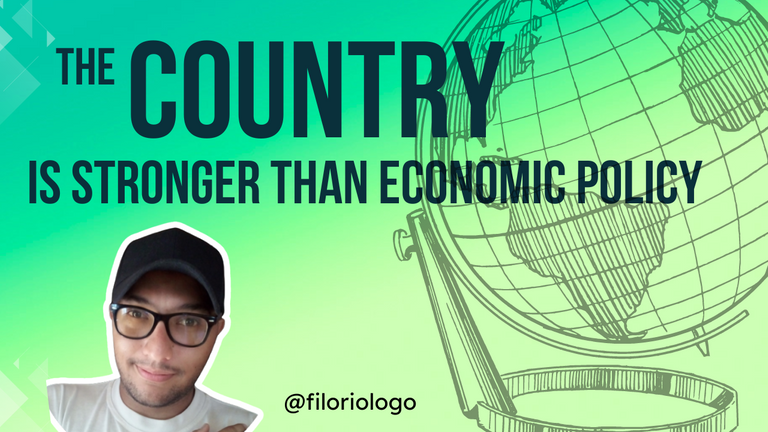The country is stronger than economic policy

Thinking about Venezuelan society is something that is inevitable for me, it is the context that surrounds me and that I try to understand a little more every day, both at historical and at socio-political level, always trying to adhere to Ortega y Gasset's phrase: * "I am myself and my circumstance, if I do not save it I will not save myself." * That is why I think that all those who are part of a region must take care of the sustainability and prosperity of their region.
I am reading a text that our teacher Luis Cirocco gave us, later I will tell you more about the text, today I stop on a phrase that I read in the book and that made me think about the Venezuelan economy.
Italian Senator Piero Bassetti made a speech on Italian economy and politics:
"We understood and immediately realized that we could not lead Italian society. The country was stronger than the policy and even more intelligent. Doing nothing was a better option than applying many government measures"
I am not an expert in economics, much less in Italian economics of the 20th century, but from the phrase that this politician seems one of the factors that had a great positive impact on the Italian economy from the 1950s was that at government level there were too many regulatory measures. That makes me think about the economic control that exists in Venezuela.
It is a quite repetitive subject to say that Venezuela has gone through an economic crisis in its last decades of history, and without thinking too much Venezuela seems the counter-example of the phrase of the senator Bassetti. Now well, there are elements that we can recover and that we do not have to look back too much to realize that Venezuelan society in an innate way has bet on economic independence without so much restriction on the part of the government entity.
The moment in which the crisis took more rudeness in the country, from the year 2017, the Venezuelan began to propose the dollar as a parallel money to the Bolivar, since between the two currencies the dollar was less prone to abrupt devaluations. Something that was quite habitual in the Venezuelan national currency. At first, I remember the transactions with the dollar were something mysterious and little by little its practice was extended throughout the territory. The Government, aware of the situation and that the level of economic sanctions from outside, from the United States towards Venezuela, in principle the government pretended not to know about this aspect of the Venezuelan economy, and over the years, practice became massive.
Today we are at a point where the prices on the shelves are shown in dollars, it is rare the shelf that shows the prices in Bolivars. Although the authorities seemed indifferent to the situation, they were always attentive, which allowed the entry of a lot of money in dollars into the country. Now well, I do not know what is the volume of dollars within Venezuelan borders, it is a really important data to appreciate.
Now, recently after several years of consolidating the practice and use of dollars in all aspects of the Venezuelan economy. An 3% tax has been imposed on transactions and marketing with the dollar. That is, before you could receive the payment in dollars without taxes beyond VAT (* value added tax *) and from a little while ago you have to take into account the 3% if you trade with dollars.
The Venezuelan government has focused on control in all aspects, and I think they have made a huge mistake in the economic. Bassetti's words can give light to today's Venezuelan society, so that citizens realize that the country is not the government, that the country is the people, and that the country is stronger than the policy.
Translated and formatted with Hive Translator by @noakmilo.
VERSIÓN EN ESPAÑOL (click here!)
El país es más fuerte que la política económica
Pensar la sociedad venezolana es algo que me es inevitable, es el contexto que me rodea y que intento entender cada día un poco más, tanto a nivel histórico como a nivel socio-político, siempre intentando apegarme a la frase de Ortega y Gasset: "Yo soy yo y mi circunstancia, si no la salvo a ella no me salvo yo." Es por ello que pienso que todos los que forman parte de una región deben velar por la sostenibilidad y prosperidad de su región.
Estoy leyendo un texto que nos obsequió el profesor Luis Cirocco, más adelante les comento más sobre el texto, hoy me detengo sobre una frase que leí en el libro y que me hizo pensar en la economía venezolana.
El senador Italiano Piero Bassetti pronunció en una alocución sobre economía y política italiana:
"Entendimos e inmediatamente nos dimos cuenta que no podiamos conducir a la sociedad italiana. El país era más fuerte que la política e incluso más inteligente. No hacer nada era una mejor opción que aplicar muchas medidas de gobierno"
No soy un experto en economía, mucho menos en economía italiana del siglo XX, pero, por la frase que esté político parece que uno de los factores que fue gran impacto positivo a la economía italiana desde los años 50 fue que a nivel gubernamental hubo demasiadas medidas regulatorias. Eso me hace pensar en el control económico que hay en Venezuela.
Es un tema bastante repetitivo el decir que Venezuela ha atravesado una crisis económica en sus ultimas décadas de historia, y sin pensarlo demasiado Venezuela parece el contra ejemplo de la frase del senador Bassetti. Ahora bien, hay elementos que podemos recobrar y que no hay que mirar muy hacia atrás para darnos cuenta que la sociedad venezolana de manera innata ha apostado por la independencia económica sin tanta restricción por parte del ente gubernamental.
El momento en el cual la crisis tomo mas rudeza en el país, a partir del año 2017, el venezolano comenzó a proponer al dólar como dinero paralelo al Bolívar, ya que entre las dos monedas el dólar era menos propenso a devaluaciones abruptas. Cosa que era bastante habitual en la moneda nacional venezolana. Al principio, recuerdo las transacciones con el dólar era algo misterioso y poco a poco se fue extendiendo su practica por todo el territorio. El Gobierno, a sabiendas de la situación y que el nivel de sanciones económicas de fuera, por parte de Estados Unidos para con Venezuela, en principio el gobierno se hizo el desentendido de este aspecto de la economía venezolana, y con el pasar de los años, la practica se hizo masiva.
Hoy estamos en un punto en el cual, los precios en los anaqueles se muestran en dólares, raro es el anaquel que muestra los precios en Bolívares. Aunque las autoridades parecían desentendidas de la situación, siempre estuvieron atentos, cosa que permitió la entrada de mucho dinero en dólares al país. Ahora bien, desconozco cual es el volumen de dólares dentro de las fronteras venezolanas, es un dato realimente importante de apreciar.
Ahora bien, recientemente luego de varios años de haber afianzado la practica y el uso de los dólares en todos los aspectos de la economía venezolana. Se ha hecho oficial un impuesto del 3% sobre las transacciones y mercadeo con el dólar. Es decir, antes podías recibir el pago en dólares sin impuestos más allá del IVA (impuesto del valor agregado) y desde hace poco hay que tomar el cuenta el 3% si comercias con dólares.
El gobierno venezolano se ha centrado el el control en todos los aspectos, y creo que en el económico han errado enormemente. Las palabras de Piero Bassetti pueden dar luz a la sociedad venezolana de hoy, a que los ciudadanos se den cuenta que el país no es el gobierno, que el país es la gente, y que el país es más fuerte que la política.

Posted Using LeoFinance Alpha
Click on the badge to view your board.
Thank you to our sponsors. Please consider supporting them.
Check out our last posts: